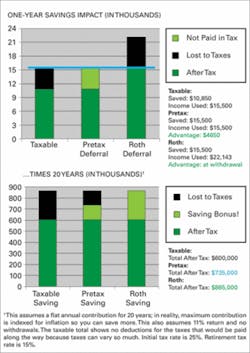Pros and cons of a Roth saving feature
For more on this topic, go to www.dentaleconomics.com and search using the following key words: 401(k) plan, Roth saving feature, Roth(k) deferrals, pros and cons of Roth saving feature.
Q I have a 401(k) plan, and I don't know whether I should add a Roth saving feature. What is Roth exactly, and what are the pros and cons?A Roth is a good feature to add, and summer is the best time to start updating your practice's retirement plan. Very generally speaking, there are two types of retirement plan accounts in a 401(k). In an employer-sponsored pretax savings account, contributions occur before income taxes are taken out; tax is due when you take withdrawals (at your retirement tax rate, when your taxable income will probably be lower).In the Roth variation, you pay tax on income before it is deposited, but no more tax is ever due. This assumes you meet the requirements, such as no withdrawals before age 59½. Earnings are tax deferred for both. If you can afford to save more, Roth may give you much more in the long run, particularly if you're young and if tax rates, now at historic lows, increase. Depending on your provider, adding Roth may be free. The chart shows the basic impact of saving in Pretax, Roth, and taxable accounts assuming a 25% tax rate.
When and why to make Roth(k) deferrals
- Retirement planning flexibility: At retirement, you can choose to take distributions from either your pretax 401(k) account or your after-tax Roth(k) account.
- Super saver: You can afford to save more.
- Starting early: If you anticipate that your income will be much higher in future years, use Roth now and pretax deferrals when your income peaks.
- Withdrawing later: You want tax-free growth as long as possible. Look at the totals after 20 years and imagine adding 20 more years!
- Tax rate: You anticipate that your tax rate at retirement will be equal to or greater than your current tax rate.
When and why to make pretax deferrals
- Maximize deferrals: Use pre-tax if funding with after-tax dollars will force you to reduce your total saving.
- Tax rate reason 1: You anticipate that you will be in a lower tax rate when you start taking plan distributions.
- Tax rate reason 2: The income reduction from pretax contributions will put you in a lower tax bracket now.
- The high achiever: Your income is peaking or even spiking this year, and you believe your income will be lower in the future.
These are only guidelines, so you need to talk strategy with your own advisor. Roth is a great option to have in your 401(k), and there really isn't a downside. Summer is a great time to review your practice's retirement plan with your advisor before fall enrollment.
Gene Dongieux is the author of "If You Have It Made, Don't Risk It: A Physician's and Dentist's Guide to Investing." As chief investment officer for Mercer Advisors, he manages more than $3 billion in client assets. Dongieux has been quoted in The Wall Street Journal and Investment Advisor magazine. Contact him at [email protected].

